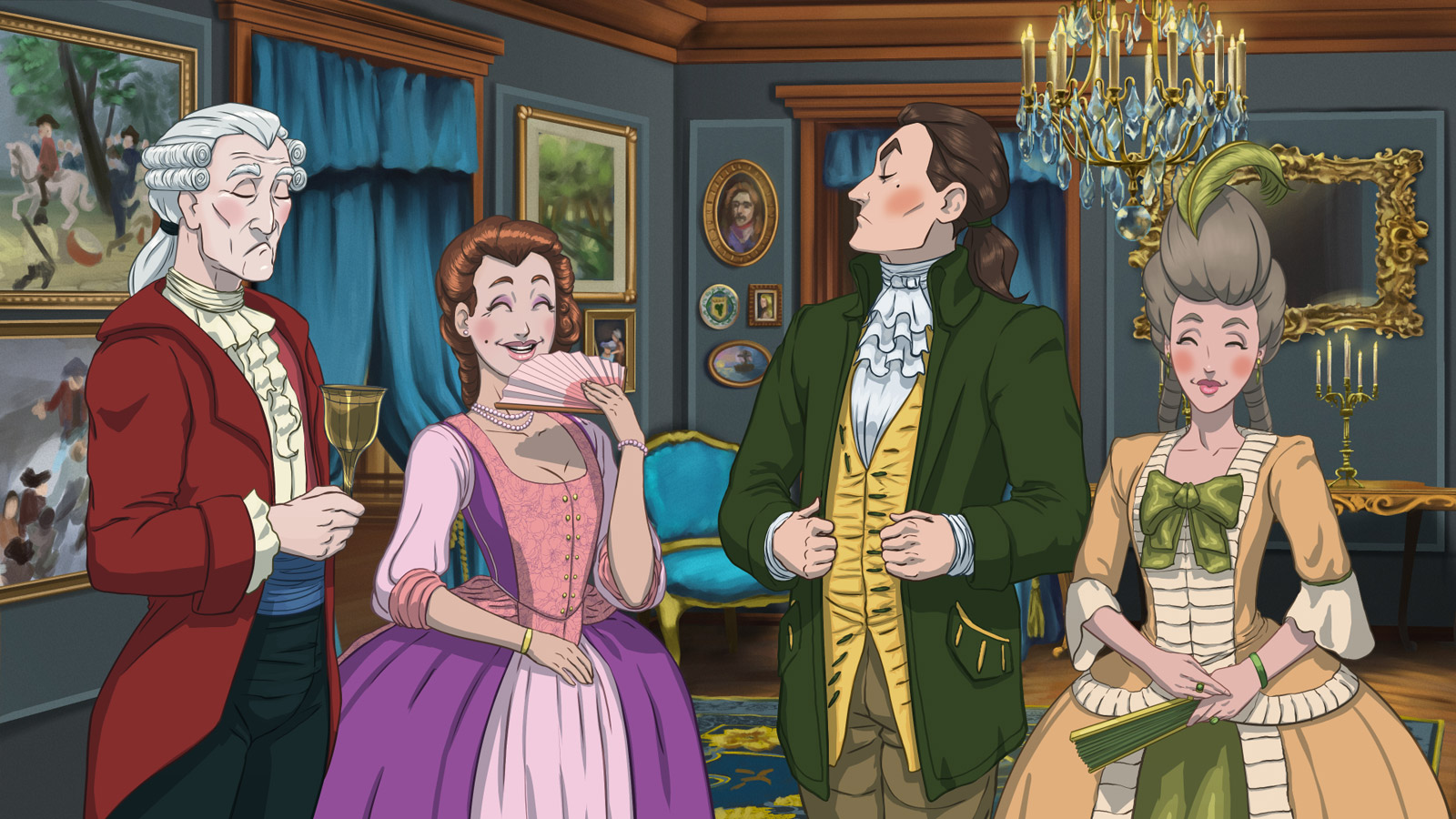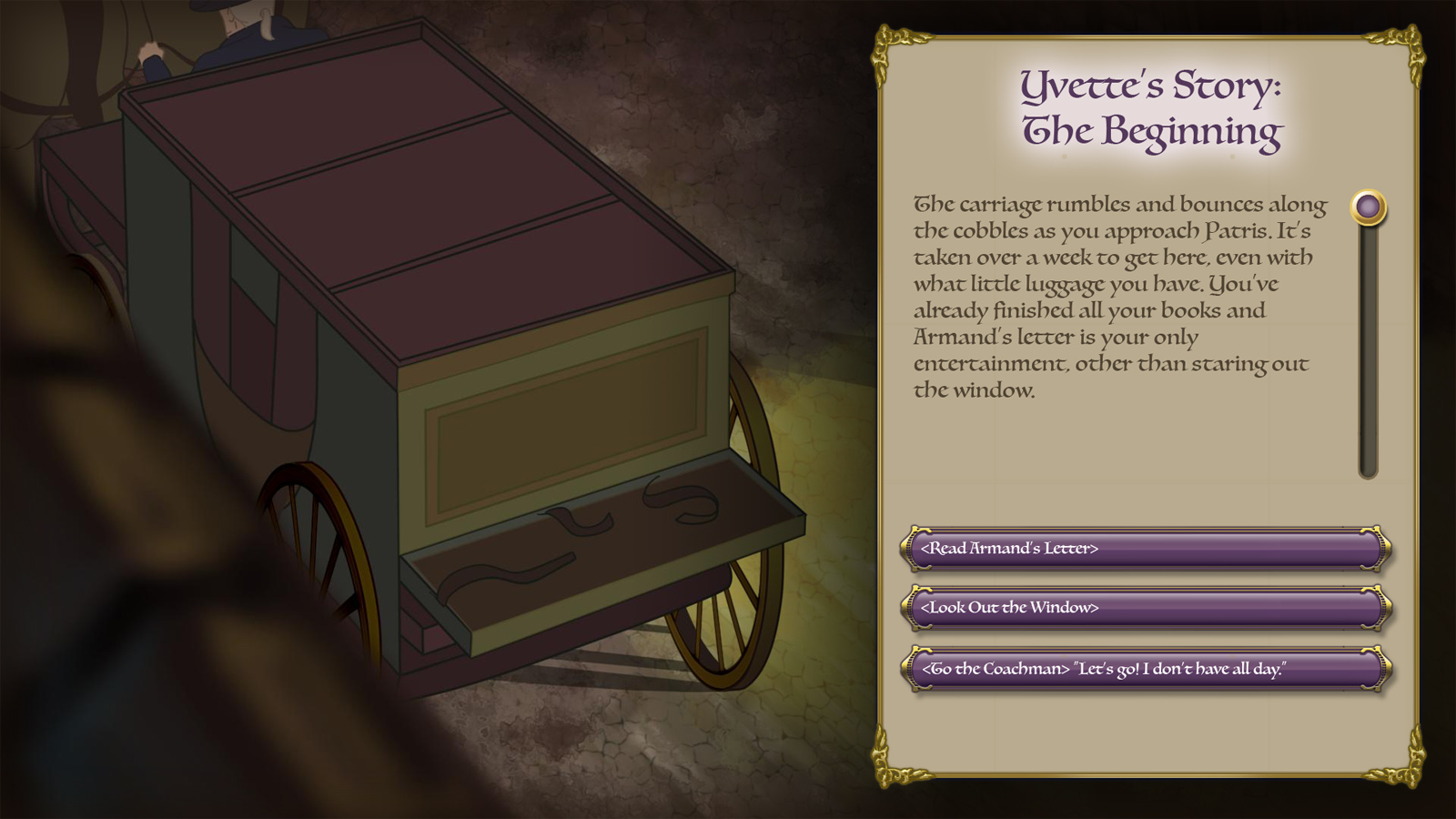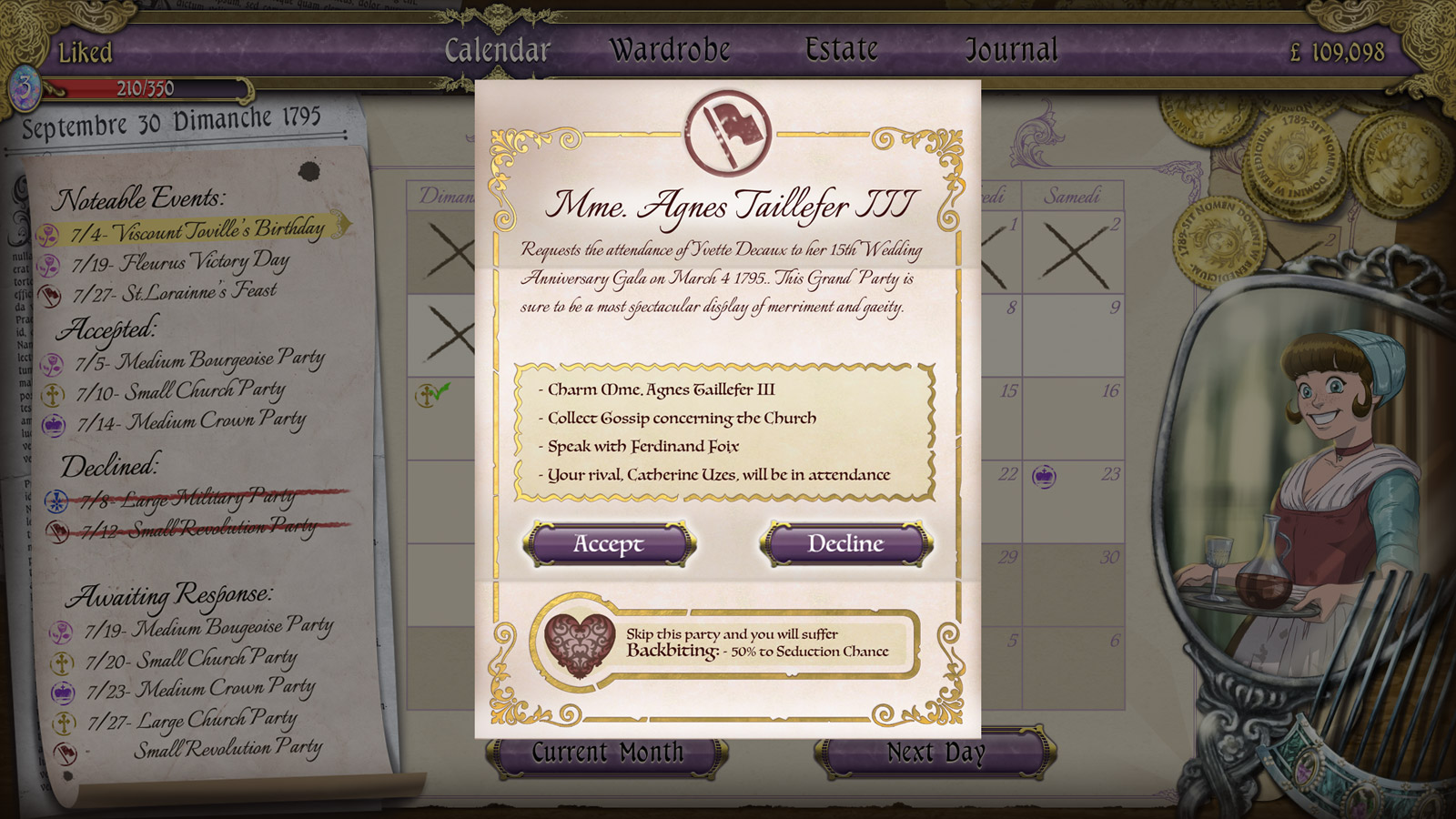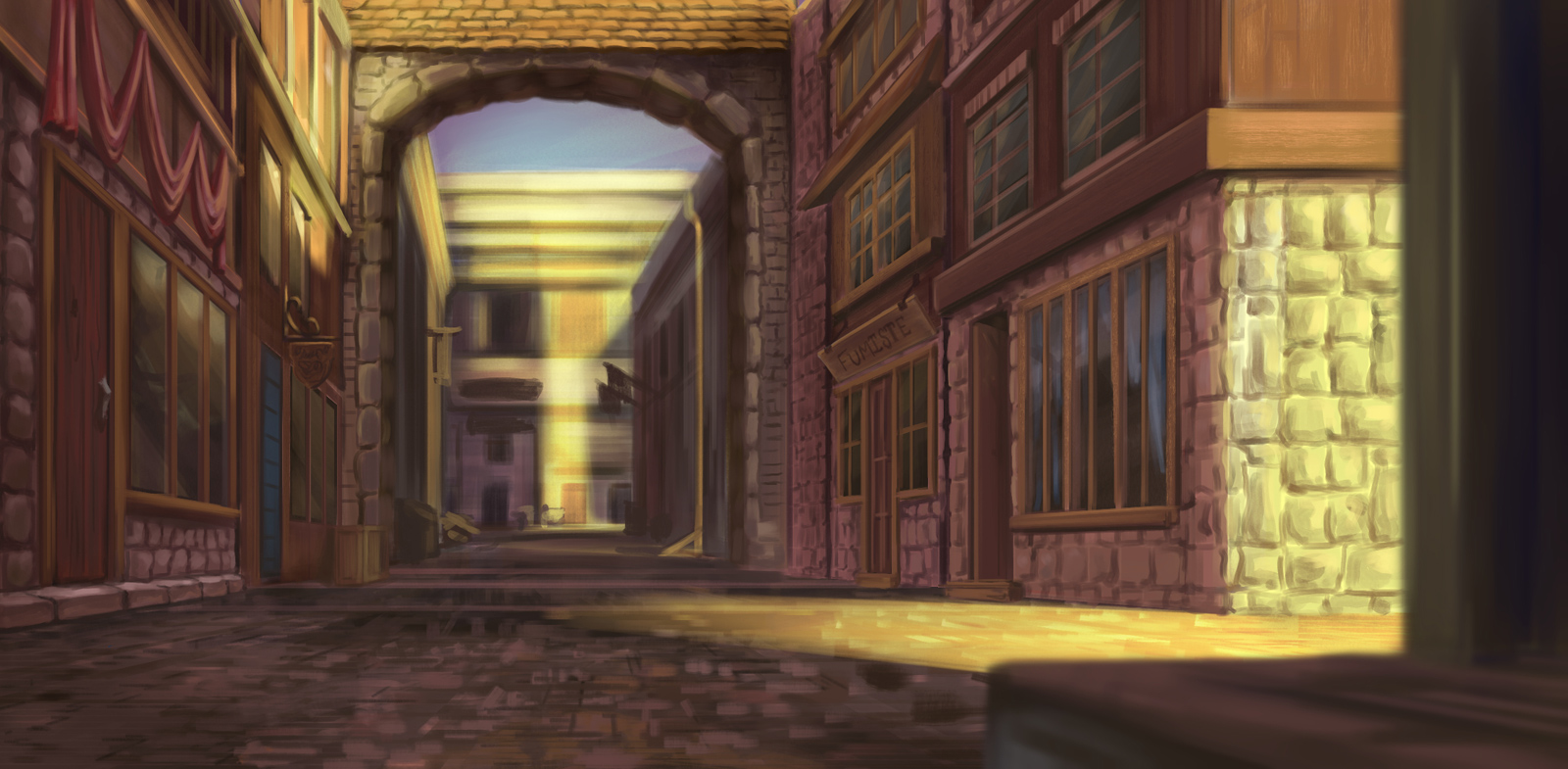Joy Manufacturing Co’s “Ambition: A Minuet in Power” Game
Play the role of a woman of fashion in pre-revolutionary France, on PC and Mac


Undeniably, some of the best storytelling shared today occurs in the world of independent video games. A testament to this, “Ambition: A Minuet in Power,” allows players to enter the world of pre-revolutionary France, where parties are battlefields, information is power and a central heroine named Yvette Decaux navigates it all. Beyond a meticulous, layered realization, the game also iterates a different world every time a player finishes one games and starts another game. Thus, every playthrough is different. It’s the vision of game designer Luther Patenge and his team at Joy Manufacturing Co. They’ve already begun production but taken to Kickstarter for financing (where a $20 pledge gets you a digital copy). The game will be delivered in standard and DRM-free versions on Steam, GoG and their website, available for both Mac and PC. Patenge, who’s been designing games since the seventh grade (with his first being what he refers to as a choose-your-own-adventure book, made in Powerpoint) has come a long way thus far. We spoke with him to better understand his mission and what he’s hoping to deliver.
Can you tell me a bit about the origin of this scenario and why you think it will make for an exciting game?
The original concept came from a pretty strange place. I was living with a roommate, and we’d regularly get drunk and watch older movies. There’s something really charming about those films that are still halfway between movies and stage plays. Specifically, we were watching the “The Three Musketeers” (1948). For those who haven’t seen that version, it’s got Gene Kelly, Angela Lansbury, Vincent Price, and Lana Turner in it. It’s amazing and campy as hell.
While we were watching it, we realized that the main villain, Milady De Winter, was actually the most interesting character in the whole thing. The musketeers and the king displayed what we called “hard power.” If they didn’t like something they could either give orders, or just stab people until they got their way. De Winter didn’t have that luxury. Her power was more social in nature, which we called “soft power.” It’s all influence. As a result, she had to work harder than anyone else to accomplish her goals. She had to work constantly. Always planning, scheming, schmoozing, seducing, and poisoning. That sounded like a much more interesting character to play in a game.
A little more tinkering with the idea led me to realize that the best settings for this kind of character, and this kind of game, would be the French Revolution. It was one of the biggest turning points in French history, and a lot of the great conflicts there were social and ideological, instead of purely physical. It was a time where men and women worked secretly in the shadows to determine the fate of their whole country. It was elegance and splendor, next to violence and squalor. A time of great romance and horrific vengeance. It’s the stuff all great stories are made of.

What sort of period research went into it all? How accurate are you going to be historically?
I’ve always been a huge history dork and I’m a firm believer that if you’re going to do a historic piece of fiction, you should do it right. For example, almost all of the outfits you’ll see in the game are based on actual fashion plates and paintings from the time period. What’s lucky for us, is that we have tons of research material. In 18th Century France, new issues of fashion magazines came out every 10 days. Trends moved at a blistering pace, even compared to today. For example, there was a major shipwreck that occurred off the coast of France. That tragedy inspired commemorative hairstyles, where fashionable ladies wore model ships in their wigs for a while, as a sign of solidarity with the fallen. It’s this kind of stuff that inspires me to stick with real history. There’s no way I would have come up with “model ship hair” on my own!
For writing research, I spend a lot of time reading history books, noting down interesting moments or details we should put in the game. I really recommend “Citizens” by Simon Schama. It’s dry but comprehensive. However, “Ambition” is a game, which means it needs to be interactive. If we stick 100% to the events of history it would be unsatisfying, because you’d never be able to change anything. What we really want to get right, most of all, is the feeling of what it would be like to be in the position of a woman like Yvette, our main character. To be someone who wants to climb their way up the social ladder, by any means necessary, but in a time of great danger and change.

How did you develop your characters?
This is embarrassing to say as a writer, but I did something you’re really not supposed to do. I envisioned the conflicts first, then built the characters from there. One of the things that’s been really important for us is making every character look and feel really distinct. I’ve had experiences where I’ve put down a game for a week and come back later and I can’t remember who the hell anyone is, because they all look the same. This has led to us experimenting with a lot of different body types in our characters, and making sure that we include characters from all over the world. After all, France was a major trade hub and people from all over came to Paris to seek their fortune. A unifying theme with many of our characters has been ambition. What do people want and what are they willing to do in order to get it?

What has been the game’s technical development to date and how will it proceed after the Kickstarter success?
The game is made in the Unity engine, which is a popular and powerful platform for making games. I originally started “Ambition” as a hobby project to teach myself Unity, but the idea was too compelling to leave it as just a hobby project. Eventually, it grew into something much bigger than that.
Once the Kickstarter succeeds, our plan is to move directly into full production, focusing on what’s called a “vertical slice.” In a vertical slice, you refine and polish up a small part of the game that represents the core mechanics of it, all the stuff that you’ll end up doing over and over again. Once this slice feels like how we envision it, we can expand into the rest of the game, handling all the other mechanics, refining the story, incorporating all the art and music. Making games is a hectic process where you have to coordinate a lot of different things moving all at once. It’s like trying to cast and direct a play while the script is still being written!
As we get everything in the game, we’ll move onto the “beta” phase, where the game is solid, but still needs refinement. There, we’ll send out this version of the game to some of our Kickstarter backers, so they can play before anyone else, and tell us what they think of it. That will help us find problems before the launch, while we fix up any last minute issues we find ourselves.

You mention this in the Kickstarter but why would players be compelled to play again?
Most story-based games use a set, linear structure to tell their stories. Events often play out in a way similar to a choose-your-own-adventure book. This means that once you play the game once, you already know how most things are going to play out. This means that replaying the game isn’t as much fun as it could be.
“Ambition,” on the other hand, uses systems to procedurally generate the world every time you start a new game. This means that every playthrough is different. Characters that appear in one playthrough might not appear in another. Even the end result of the revolution itself is up for grabs. It may be a crushing success or a dismal failure. As a result, among other things, the player will have a keep an eye on political events as they unfold. This will help them predict who the victor of this particular playthrough will be, the Crown or the Revolutionaries. After all, you want to end up on the winning side of history, not the losing side of the guillotine.

Can you talk about the development of your independent studio?
In August 2016, after around four-five years in the games industry, my team at RockYou Inc, a mobile/social games company, got dissolved. I’d been working on “Ambition” on and off as a fun side project, but I’d also been saving money because I knew I wanted to go indie someday. So, we got fired and the first thought in my head was “Oh shit, this is my chance!” Thankfully, I didn’t say that out loud.

Instead of applying for new jobs I decided to start working on “Ambition” full time. I got the game to a rough prototype before I started showing it to people. A few former co-workers thought the project was cool and signed up. From there, we started drafting budgets and fleshing out the game. It became apparent pretty quickly that there was no way we’d be able to finish the game on our personal savings, especially if we wanted it to be as polished as we were hoping. That’s when we pivoted towards making a Kickstarter Campaign, which requires a lot more work to set up than you’d think. There’s no such thing as easy money.
That brings us here! Our Kickstarter is live, our trailer is beautiful, and we’re trying to get the funds to make something truly unique. We’re creating a game that we’d never be allowed to make at a larger company, because it’s just too different from what’s in the general market.
Images courtesy of Joy Manufacturing Co












